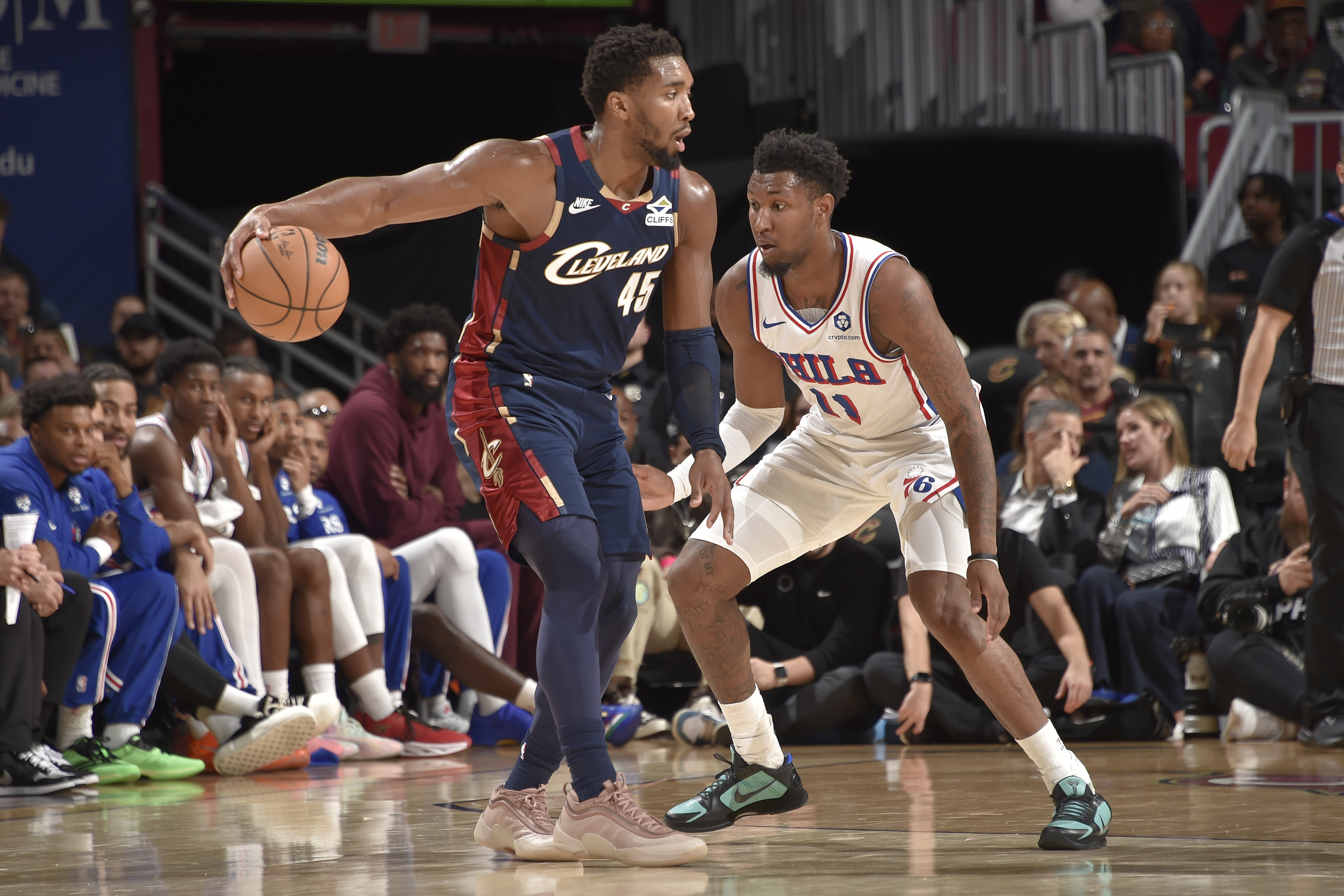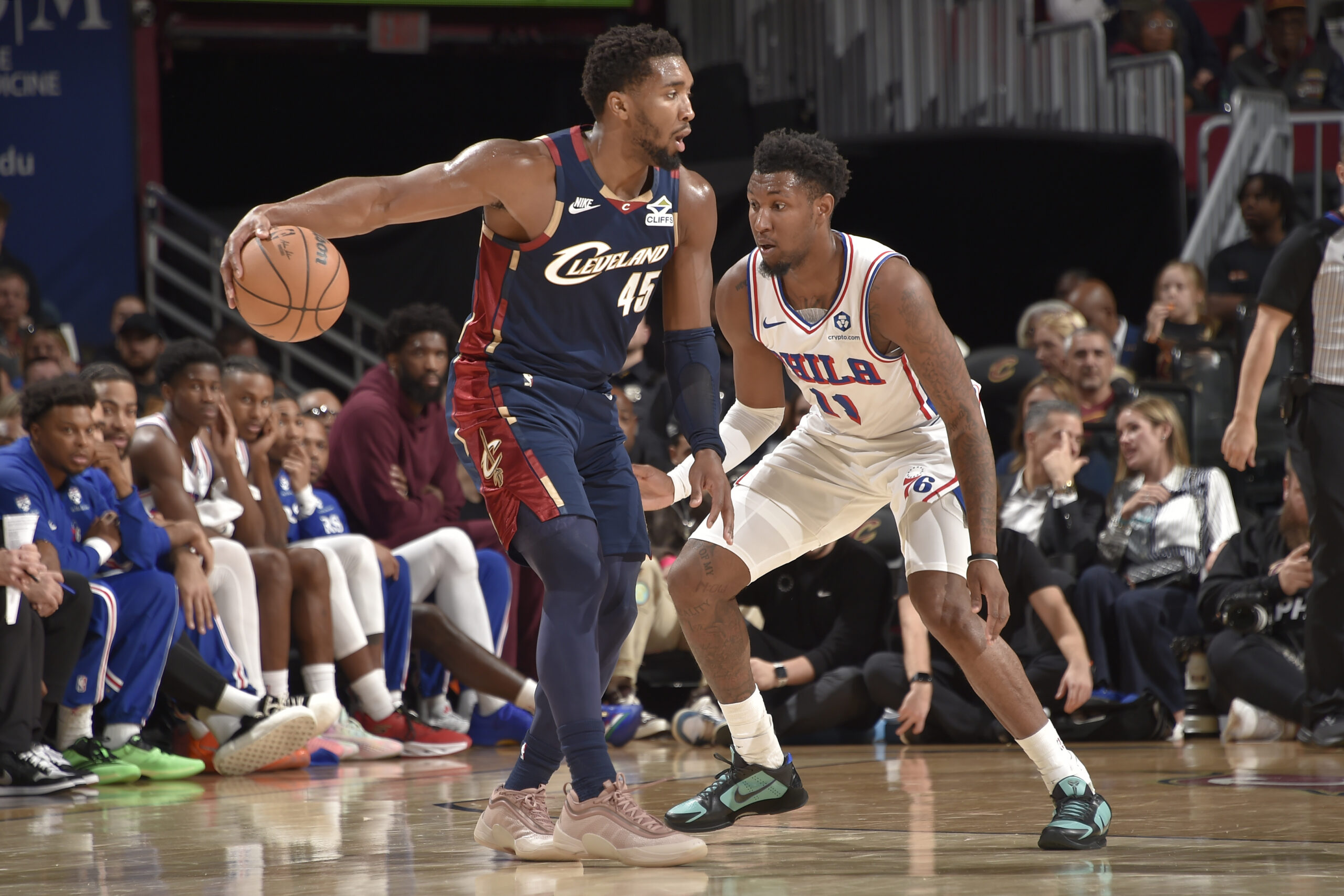Donovan Mitchell’s 46-Point Outburst: A Reminder That Virtual Insults Can Ignite Real Life Fire In Sports Rivalries
In the fast-paced world of professional sports, motivation can come from the most unexpected sources. For Donovan Mitchell, the star guard of the Cleveland Cavaliers, an offhand insult from an opponent during an NBA 2K video game became a fiery catalyst for one of the most memorable performances of his career. Hours before taking the court, a virtual rival dared to call Mitchell “washed up,” a phrase that struck a chord deep within his competitive spirit. The incident exemplifies how athletes can harness anger and pride from virtual interactions, transforming them into tangible, on-court success.
On the night Mitchell soared to a staggering 46 points in a commanding victory over the Philadelphia 76ers, he revealed the source of his newfound drive, stating, “This kid pissed me off today. I was playing 2K for like two hours… and he just called me washed up. He called me a bunch of things… I just told him, we’ll see… this game was for that kid… or grown man.” This declaration underscores the notion that, for elite athletes, the lines between the virtual world and real-life competition often blur, leading to outcomes that can surprise both fans and critics alike.
The modern athlete is not just engaged in physical battles on the court; they find themselves in constant skirmishes across social media, gaming platforms, and more recently, virtual arenas. The competitive nature inherent to athletes means that even digital taunts can elicit intense responses. In Mitchell’s case, the insult acted as a motivational fuel, igniting his performance as he led his team to a 132-121 win over the 76ers. His shooting percentage was stellar, hitting 15 of his 21 attempts, a display of efficiency rarely seen at that level. Each shot and each highlight reel moment served to emphasize the absurdity and impact of a throwaway comment made in a digital space.
The psychological elements of sport are complex and fascinating. The ability to channel anger into performance is not unique to Mitchell. Many athletes have openly discussed how they utilize slights, criticisms, or even outright insults as motivation to push beyond their perceived limits. It speaks to the deeper narrative that success often intertwines with the struggles faced by the competitors. For Mitchell, the virtual insult transformed what might be perceived as a minor affront into a significant psychological trigger, compelling him to assert his place on the court and remind all critics of his vitality as a player.
Cleveland’s performance that night was not solely reliant on Mitchell; the team exhibited a collective synergy, playing their best game of the season. The Cavaliers came out strong, bolstered by their star guard’s electrifying energy. Mitchell’s teammates flourished under the renewed emblematic spirit, which was amplified by the nostalgic reintroduction of their 2009 branding. The retro logo and colorway, greeted warmly by fans, contributed to the romantic magic of that night, drawing on a time of past triumphs while building steadily toward future aspirations.
Reflecting on these iconic elements of sports history, it becomes evident that the essence of a franchise often lies in its ability to evoke emotions. For Mitchell, hearing the theme song “My Time,” during warm-ups—a soundtrack connected to his childhood—added another layer of motivation. He noted, “This was really cool to me… I’m kind of hoping we keep the court, but we’ll see.” The blend of nostalgia and competitive fire created a remarkable atmosphere, not only for the players on the court but also for fans who may long to witness that level of passion and performance run consistently throughout the season.
Mitchell’s night represented a collective effort by the Cavaliers to reinvigorate their brand while embracing their historical roots. While they only plan to replicate their 2009 branding for a handful of games this season, the success derived from such evenings raises questions about the impact of nostalgia in contemporary sports. Can reviving past glory revive current performances? For Cleveland, if the energy from branding retrofits translates into tangible successes on the court, it may lead to pleas from fans for a more enduring reminder of their storied past.
As players like Donovan Mitchell continue to thrive through competitive rivalries—whether real or virtual—the intersection of modern sports with digital discourse becomes increasingly apparent. Every jab, every slight, or witty remark could hide more than just a moment of humor; they could be the spark necessary to ignite a fire in an athlete’s spirit on game day. The excitement this creates amongst fans and spectators emphasizes a cycle that constantly fuels the sport: the blend of emotion, competition, and community, where every player is not only competing for individual accolades but also for respect, camaraderie, and a place in the annals of history.
Through moments like these, it’s undeniable that the impact of social media and online interactions stretches beyond banter, affecting performance and the dynamics within a team. Donovan Mitchell’s story is but one of many that showcases the electric undercurrents present in professional sports, as athletes increasingly find themselves weaving through the complexities of competition in both the physical world and the digital landscape. In a season that has just begun, fans and players alike can only speculate on how these narratives will play out, creating an ever-evolving tale of rivalry, redemption, and redemption that defines the modern age of sports.

Tonight, Donovan Mitchell put together one of his best performances in a Cleveland Cavaliers uniform — all because an opponent on NBA 2K told him he was ‘washed up’ just hours before the game.
“This kid pissed me off today,” Mitchell said after the game. “I was playing 2K for like two hours… and he just called me washe dup. He called me a bunch of things. He said he ain’t seen a highlight from me in a minute. I just told him, we’ll see… this game was for that kid… or grown man.”
NBA players are highly competitive athletes. It doesn’t take much for them to find motivation, especially when rage-fueled inspiration can be found on any corner of the internet. Someone calling you out right before a game is more than enough motivation for someone like Mitchell.
Mitchell certainly proved his point. He scored 46 points on 15-21 shooting, throwing in a handful of highlights to appease his online troll. He did it all while making it look easy.
The Cavaliers, led by Mitchell, stormed to a 132-121 victory over the 76ers. Mitchell was a key part in this, dicing up Philly’s defense and leaving them with no solutions. But Mitchell wasn’t the only Cavalier who had it rolling. The team as a whole played its best game of the young season.
Mitchell’s big game happened on a night when the Cavs reintroduced their 2009 branding. The retro logo and colorway have long been fan favorites. The franchise went all-in on nostalgia, and everyone seemed to love it.
“This was really cool to me, the song in the intro ‘My Time’ with Fab, like, I listened to that pre-game when I was a kid,” said Mitchell. “As a whole, this night was really dope… I’m kind of hoping we keep the court, but we’ll see.”
The Cavs only plan on replicating their 2009 brand for a handful of games this season. Though I don’t know if anyone would complain if they brought it back full-time in the near future.

